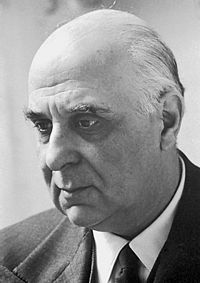Also known as:
George Seferis, Yiorgos Seferis, Γιώργος Σεφέρης
More People of Greece
More Topic Categories
Related Destinations
Giorgos Seferis (13/03/1900 - 20/09/1971)
 Giorgos Seferis is one of the most important Greek poets and along with Odysseas Elytis, he is one of the Greek recipients of the Nobel Prize in Literature.
Giorgos Seferis is one of the most important Greek poets and along with Odysseas Elytis, he is one of the Greek recipients of the Nobel Prize in Literature.His real name was Giorgos Seferiadis and he was born in Smyrni in 1900. He started his education at Aronis Lyceum in 1906; in 1914, while writing his first poems, the Great War broke out and his family was forced to settle in Greece. There, he continued his studied at the Classical High School of Athens and graduated in 1917. Later, his family moved to Paris, where Giorgos remained until 1924, studying literature and completing his law degree. That’s when he moved to London for a short time, in order to perfect his English. In 1925, he returned to Athens and two years later, he was appointed embassy attaché at the Diplomatic Service of the Ministry of Foreign Affairs. In 1931, he published the first poem under the name Giorgos Seferis, which was called “Strofi”, and later that year, he became the vice consul and director of the Greek Consulate in London.
In 1941, Seferis was married to Maria Zannou and followed the Greek government to Alexandria, Egypt. Afterwards, he followed Princess Frederica and her children to Johannesburg and Pretoria, working at the Greek Embassy there until 1942. Due to his work, Seferis was forced into constant moving.
Although his education was more European rather than Greek, not only did he not scoff at Greek literature, but he studied it extensively, in his effort to renew it. His poems were inspired by a number of important people, including T.S. Elliot, Paul Claudel, Paul Valery and Ezra Pound. However, the main event that scarred him for life, upon which he based his later work, was the Great Disaster of 1922 and the forced expulsion of the Greeks of Asia Minor.
In 1963, Seferis’ reputation went beyond the national borders and became known worldwide, as it was the year he received the Nobel Prize in Literature by the Swedish Academy of Science, “for his eminent lyrical writing, inspired by a deep feeling for the Hellenic world of culture”. He was the first Greek to receive this highly prestigious award and was later followed by Odysseas Elytis in 1979. In 1967, the Regime of the Colonels seized power, abolishing democracy. Seferis fiercely opposed the dictators, not only in writing but also in his public speeches. In 1969, he made a statement on BBC, stating that the anomaly of the dictatorship must come to an end. Because of these actions, the dictatorship removed the title of Honorary Consul from him, as well as his right to use a diplomatic passport. In 1971, he died and his funeral eventually turned into a silent protest against the regime.
See Also:
 Athens Photos
Athens Photos
 Santorini Photos
Santorini Photos
 Crete Photos
Crete Photos
 Meteora Photos
Meteora Photos
 Corfu Photos
Corfu Photos


